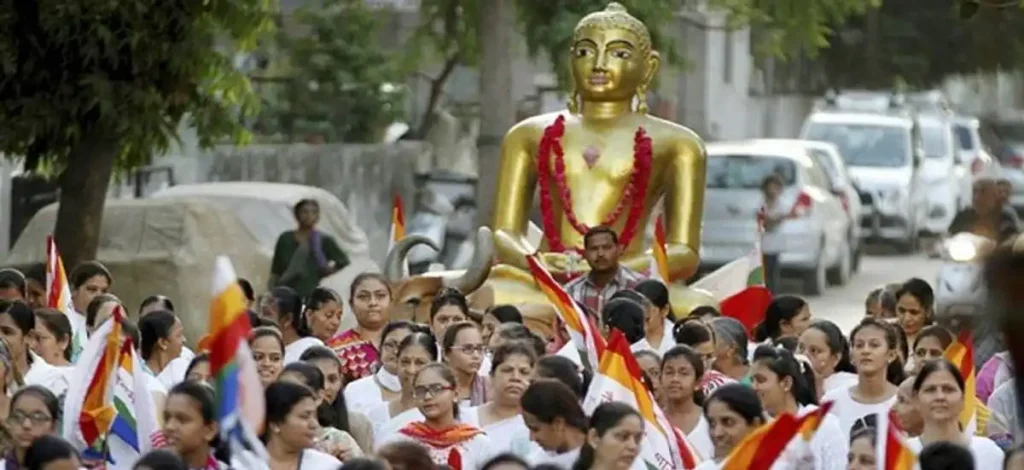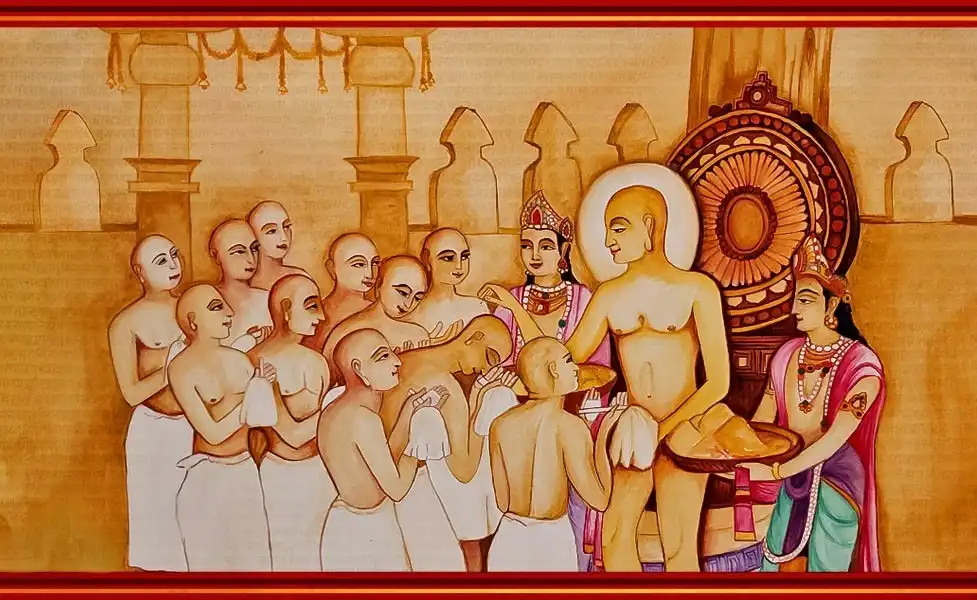Introduction
Mahavir Jayanti is one of the most important festivals for Jains around the world. It marks the birth of Lord Mahavir, the 24th Tirthankara of Jainism, who taught the world about non-violence, truth, and compassion. This special day is celebrated with great devotion and joy, especially in India. But who was Lord Mahavir, and why is this day so important? Let’s find out!

Who Was Lord Mahavir?
Lord Mahavir was born around 599 BCE in Kundagrama, which is now in Bihar, India. His parents, King Siddhartha and Queen Trishala, were noble rulers. According to Jain beliefs, Queen Trishala had 14 (or in some accounts, 16) dreams before his birth, predicting that he would be a great leader or a spiritual guide.

Even as a child, Mahavir showed signs of wisdom and kindness. He was deeply compassionate and believed in non-violence (Ahimsa). At the age of 30, he renounced his royal life and worldly possessions to seek spiritual enlightenment. After 12 years of intense meditation and self-discipline, he attained Kevala Jnana (absolute knowledge) and became a Tirthankara—a spiritual teacher who guides others towards liberation.

Why Is Mahavir Jayanti Celebrated?
Mahavir Jayanti celebrates the birth of Lord Mahavir and reminds people of his teachings. His principles of Ahimsa (non-violence), Satya (truth), Asteya (non-stealing), Brahmacharya (chastity), and Aparigraha (non-possessiveness) are the foundation of Jainism.

On this day, Jains reflect on his teachings and strive to follow them in their daily lives. His message is not just for Jains but for everyone who believes in kindness and peace.

How Is Mahavir Jayanti Celebrated?
The festival is observed with great enthusiasm in Jain temples and homes. Here are some key traditions of the day:
1. Early Morning Prayers
The celebrations begin with prayers at Jain temples. Devotees offer flowers, fruits, and sweets to the idol of Lord Mahavir.

2. Abhishek (Holy Bathing of the Idol)
A sacred ritual called Abhishek is performed, where the idol of Mahavir is bathed with milk, water, and fragrant pastes.

3. Processions and Rath Yatras
In many places, grand processions, known as Rath Yatras, take place. A beautifully decorated chariot carries the idol of Lord Mahavir while devotees sing bhajans (devotional songs) and chant prayers.

4. Charity and Helping Others
Jains believe in compassion and generosity. On Mahavir Jayanti, they donate food, clothes, and money to the poor. Many people also organise animal welfare events to promote kindness towards all living beings.

5. Lectures on Lord Mahavir’s Teachings
Jain scholars and monks give discourses on Mahavir’s life and principles. These teachings inspire people to lead a life of truth and peace.

6. Fasting and Meditation
Many Jains observe a fast on this day as a way of showing devotion. They also spend time in meditation and prayers.

Teachings of Lord Mahavir
Lord Mahavir’s teachings are simple yet powerful. Here are some of his key messages:
- Ahimsa (Non-violence): Do not harm any living being, whether human, animal, or even an insect.
- Truthfulness: Always speak the truth, no matter the situation.
- Non-possessiveness: Avoid being greedy and learn to live with only what you need.
- Self-discipline: Control your desires and lead a pure life.
- Compassion: Show kindness to everyone, including animals and nature.

His teachings continue to inspire people across the world, reminding them to be kind, honest, and peaceful.
Fun Facts About Mahavir Jayanti
- Mahavir Jayanti falls on the 13th day of the Chaitra month in the Hindu calendar (March or April in the Gregorian calendar).
- In some Jain communities, it is celebrated with plays and dramas depicting the life of Lord Mahavir.
- It is a public holiday in India, and many businesses and schools remain closed.
- Lord Mahavir is often depicted in a meditative pose, showing his deep spiritual wisdom.

Why Is Mahavir Jayanti Important Today?
Even though Lord Mahavir lived more than 2,500 years ago, his message is still relevant today. In a world where violence, dishonesty, and greed are common, his teachings remind us to be kind, truthful, and selfless. By following his principles, we can make the world a better and more peaceful place.

Conclusion
Mahavir Jayanti is not just a festival; it is a day to remember the values of peace, nonviolence, and truthfulness. Whether you are Jain or not, you can learn a lot from Lord Mahavir’s life and teachings. This Mahavir Jayanti, let’s promise to be kinder, more honest, and more respectful of all living beings!
For more interesting Story, please visit www.kidzherald.com





